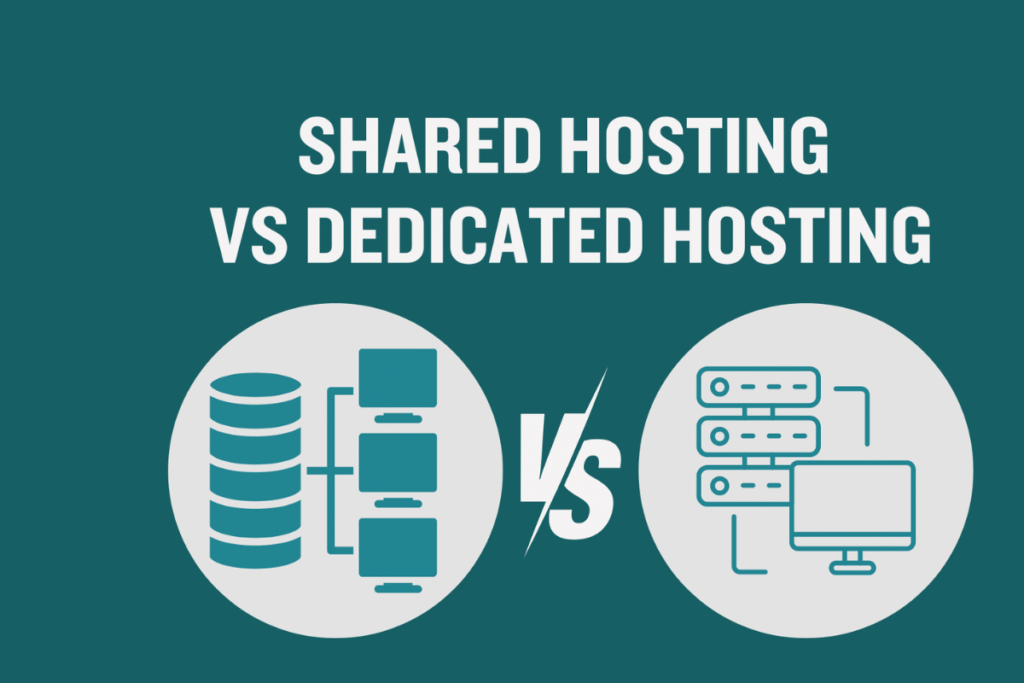When you’re setting up a website, one of the first and most important decisions you’ll face is choosing the right hosting plan. The hosting solution you pick doesn’t just determine how much you’ll pay—it also impacts your website’s speed, security, uptime, and overall performance. Among the most popular options, Dedicated Hosting and Shared Hosting stand out as two very different approaches.
But which one is better? The answer depends on your goals, your website’s needs, and your budget. In this detailed guide, we’ll break down everything you need to know about dedicated and shared hosting so you can make an informed decision.
What Is Shared Hosting?
Shared hosting is the most common type of web hosting, especially for beginners. In this setup, multiple websites are hosted on a single physical server. That means the server’s resources—such as CPU, RAM, storage, and bandwidth—are divided among many users.
It’s like renting an apartment in a large building: you share the infrastructure with your neighbors, but you still have your own private space.Key Features of Shared Hosting:
-
Low Cost: Typically the cheapest hosting option available.
-
Easy Setup: Comes with user-friendly control panels like cPanel or Plesk.
-
Maintenance-Free: The hosting provider manages server upkeep and security.
-
Beginner-Friendly: Ideal for personal blogs, small business websites, and portfolios.
What Is Dedicated Hosting?
Dedicated hosting is a premium solution where an entire server is reserved for a single client. Unlike shared hosting, you don’t share resources with anyone else—you have full control over the server’s hardware, software, and configurations.
It’s like owning a private villa instead of living in a shared apartment. You’re in charge of everything, but you also have full access to all the benefits.
Key Features of Dedicated Hosting:
-
Exclusive Resources: Full access to the server’s CPU, memory, storage, and bandwidth.
-
High Performance: Can handle high-traffic websites without slowdowns.
-
Customization: Choose your operating system, software stack, and configurations.
-
Enhanced Security: Strong protection against cyberattacks since you’re not sharing with others.
-
Scalability: Suitable for large businesses, eCommerce platforms, or enterprise websites.
Shared Hosting vs. Dedicated Hosting: Head-to-Head Comparison
Let’s compare the two hosting types across several crucial factors.
1. Performance
-
Shared Hosting: Performance depends on how many websites are on the server and how much traffic they generate. If one site spikes in traffic, it can slow down yours.
-
Dedicated Hosting: Provides consistent and top-notch performance since all server resources are reserved for your website.
👉 Winner: Dedicated Hosting
2. Cost
-
Shared Hosting: Very affordable, with plans starting as low as $2–$10 per month.
-
Dedicated Hosting: Expensive, often ranging from $80–$500+ per month depending on configurations.
👉 Winner: Shared Hosting
3. Security
-
Shared Hosting: Riskier since multiple websites share the same environment. A security breach in one site could potentially affect others.
-
Dedicated Hosting: Highly secure with dedicated firewalls, monitoring, and the ability to customize security settings.
👉 Winner: Dedicated Hosting
4. Technical Control
-
Shared Hosting: Limited control; the hosting provider handles most configurations. Good for beginners.
-
Dedicated Hosting: Full root access, allowing custom software installations and advanced configurations. Best for tech-savvy users.
👉 Winner: Dedicated Hosting
5. Scalability
-
Shared Hosting: Can handle basic websites but struggles with growth. Limited upgrade potential.
-
Dedicated Hosting: Scales easily to meet growing traffic and complex needs.
👉 Winner: Dedicated Hosting
6. Ease of Use
-
Shared Hosting: Extremely beginner-friendly with one-click installations and managed services.
-
Dedicated Hosting: Requires technical expertise or hiring a system administrator.
👉 Winner: Shared Hosting
7. Website Type Suitability
-
Shared Hosting: Best for small blogs, portfolios, or startup websites with low traffic.
-
Dedicated Hosting: Best for large businesses, eCommerce stores, applications, and high-traffic websites.
👉 Winner: Depends on Use Case
Pros and Cons of Shared Hosting
✅ Pros:
-
Affordable pricing
-
Easy to set up and manage
-
Suitable for beginners
-
Hosting company handles maintenance
❌ Cons:
-
Limited performance
-
Higher security risks
-
Little to no server customization
-
Unreliable during traffic spikes
Pros and Cons of Dedicated Hosting
✅ Pros:
-
Superior speed and performance
-
Maximum security and control
-
Handles heavy traffic easily
-
Complete customization
❌ Cons:
-
High cost
-
Requires technical knowledge
-
May need dedicated staff to manage
Use Cases: When to Choose Shared Hosting
Shared hosting is ideal if you are:
-
Running a personal blog or small portfolio website.
-
Launching a startup or small business website with low traffic.
-
Hosting a website for a local community, school, or hobby project.
-
Looking for an affordable, beginner-friendly solution.
Use Cases: When to Choose Dedicated Hosting
Dedicated hosting makes sense if you are:
-
Running a large-scale eCommerce store with thousands of visitors.
-
Hosting mission-critical business applications.
-
Running media-heavy websites (video streaming, gaming, SaaS platforms).
-
Concerned about data security and compliance (healthcare, finance, legal industries).
-
Experiencing rapid traffic growth that shared or VPS hosting can’t handle.
Alternatives Between Shared and Dedicated Hosting
If you feel that neither shared nor dedicated hosting fits perfectly, there are middle-ground options:
-
VPS Hosting (Virtual Private Server): A hybrid solution where one physical server is divided into multiple virtual servers, giving you more control than shared hosting but at a lower cost than dedicated hosting.
-
Cloud Hosting: Resources are pulled from multiple servers, offering scalability and reliability. Great for growing businesses.
-
Managed WordPress Hosting: Tailored specifically for WordPress websites, balancing performance and ease of use.
Cost Breakdown: Shared vs. Dedicated Hosting
| Feature | Shared Hosting | Dedicated Hosting |
|---|---|---|
| Average Price | $2 – $10/month | $80 – $500+/month |
| Setup Complexity | Very Easy | Moderate to Difficult |
| Security | Basic | Advanced |
| Traffic Capacity | Low to Medium | High to Unlimited |
| Customization | Very Limited | Full Control |
Which Hosting Is Better?
The truth is, neither shared hosting nor dedicated hosting is universally “better.” Instead, it depends on your unique needs.
-
If you’re just starting out, want to save money, and don’t expect high traffic → Shared Hosting is the better choice.
-
If you run a large, resource-intensive website that demands top-notch performance and security → Dedicated Hosting is worth the investment.
Think of it this way:
-
Shared Hosting = Renting an apartment (affordable, convenient, but limited).
-
Dedicated Hosting = Owning a house (expensive, but full freedom and control).
Final Thoughts
Choosing between dedicated hosting and shared hosting comes down to balancing cost, performance, control, and security. Shared hosting is perfect for beginners and small websites, while dedicated hosting shines for enterprises and high-demand platforms.
FAQs
Is dedicated hosting faster than shared hosting?
Yes. Since dedicated hosting gives you exclusive resources, it ensures faster load times and consistent performance compared to shared hosting.
Can I upgrade from shared hosting to dedicated hosting later?
Absolutely. Most hosting providers allow upgrades, so you can start with shared hosting and move to dedicated as your website grows.
Do I need technical skills for dedicated hosting?
Yes, dedicated hosting often requires server management knowledge. However, you can opt for managed dedicated hosting, where the provider handles technical tasks.
Which hosting type is best for eCommerce websites?
Dedicated hosting (or VPS/Cloud) is usually recommended for eCommerce due to high traffic, security needs, and payment processing.
Is shared hosting secure enough for business websites?
Shared hosting includes basic security, but it’s riskier compared to dedicated hosting. If handling sensitive customer data, dedicated hosting is safer.

